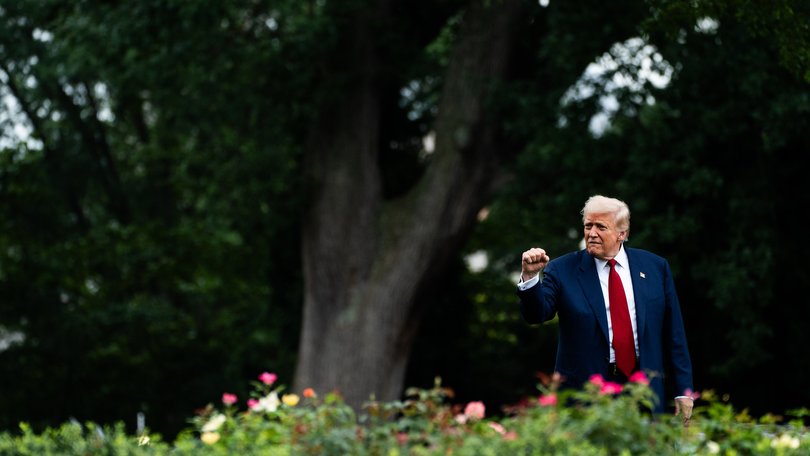Economic fears of investors are here - and fed by Trump’s reaction

For months, the US economy appeared to be weathering the disruptive effects of President Donald Trump’s trade and immigration policies.
But over the course of 72 hours, that sunny outlook darkened, as the latest government data this week showed the president’s revolutionary remaking of the world’s largest economy had hit a snag.
Friday’s disappointing jobs report revealed a labor market that is much weaker than either the White House or Federal Reserve understood. Inflation, the voter irritant that helped return Mr Trump to the Oval Office, is proving newly stubborn. And consumers are growing more cautious with their spending.
Sign up to The Nightly's newsletters.
Get the first look at the digital newspaper, curated daily stories and breaking headlines delivered to your inbox.
By continuing you agree to our Terms and Privacy Policy.After campaigning on a pledge to free business from worrying about Washington’s dictates, Mr Trump has made public policy - and his own norm-busting behaviour - the primary variables affecting the $30 trillion U.S. economy, economists said.
It all adds up to an economy that grew at an annual rate of 1.2 percent over the first half of the year, a notable downshift from its 2.4 percent pace at the end of 2024. The S&P 500 index, which has been on a tear since mid-April, reacted by shedding 2.5 percent of its value this week.
“We’re seeing dramatic changes in policy across multiple dimensions. Mr Trump inherited an economy that was in very good shape, that was in balance. He is trying to move it to a different equilibrium. And the corporate sector and everyone else are in the process of adjusting,” said Eric Winograd, senior vice president of AllianceBernstein in New York.
That adjustment grew even tougher on Friday, when the president ordered the head of the Bureau of Labor Statistics fired over claims that she had tampered with employment figures to hurt him politically, without presenting evidence.
Even as the costs of his policies became more apparent, the action ignited worries that Mr Trump’s volatile temperament could cause additional economic harm by undermining market confidence in the government data that investors, business executives and policymakers require to make decisions.
Firing a nonpartisan analyst for delivering bad news was “straight out of an autocratic playbook,” said Heidi Shierholz, former chief economist of the Labor Department and now the president of the Economic Policy Institute, a left-of-center think tank.
“If policymakers and the public can’t trust the data - or suspect the data are being manipulated - confidence collapses and reasonable economic decision-making becomes impossible. It’s like trying to drive a car blindfolded,” she said.
What provoked Mr Trump’s ire was news that employers had created just 73,000 jobs in July and that the BLS had overstated hiring for the prior two months by 258,000 positions. The downward revisions left total new hiring over the past three months at an anemic 106,000 compared with the 368,000 jobs created during the same period in 2024.
Mr Trump’s command to cashier Erika McEntarfer, a veteran labor economist who had helmed the agency since January 2024, drew widespread criticism including from the ex-Heritage Foundation economist he had appointed to that post in 2017, William Beach, who called the firing “totally groundless.”
The President’s thirst for complete control of public agencies’ data and decisions extends to the nation’s central bank. On Friday, Mr Trump - who has simultaneously said the economy was “booming” and called for urgent interest rate cuts to spur growth - resumed his attacks on Fed Chair Jerome H. Powell.
“Jerome ‘Too Late’ Powell, a stubborn MORON, must substantially lower interest rates, NOW,” Mr Trump wrote on social media, one week after telling reporters the Fed chief was “a very good man.”
The President has repeatedly mused about a near-unprecedented firing of Mr Powell for refusing to cut rates to levels normally seen during profound economic weakness. This week, the Fed’s monetary policy committee opted to stand pat, with Powell later telling reporters that the labor market was “solid.”
The weak jobs report that Mr Trump assailed may, ironically, increase the odds that the Fed will cut rates at its next meeting, in September. Investors believe there is a more than 80 percent chance of a rate cut next month, based on trading in financial instruments that track central bank actions, according to CME Group.
On Friday, Adriana Kugler, a member of the Fed’s Board of Governors, announced her resignation, giving Mr Trump an early opportunity to name a replacement who shares his desire for cheaper money. Kugler, whose term does not expire until January, was named to the board by President Joe Biden in 2023. She plans to return to her position as a professor at Georgetown University.
As a 2024 candidate, Mr Trump promised to “cut costly and burdensome regulations.” The president has slashed environmental mandates, taken a largely hands-off stance toward development of artificial intelligence, and mandated the elimination of 10 old regulations for each new rule.
Yet the sheer scale of Mr Trump’s economic ambitions, and his 24-7 social media pronouncements, have made Washington the focus of business and investment decision-making.
“Government policy [has] been the biggest change over the past couple of months,” said Erica Groshen, senior labor market adviser at Cornell University who served as BLS commissioner from 2013 to 2017.
Mr Trump’s policies are dominating labor market trends. Uncertainty about his trade policy, which has lifted tariffs to their highest average rate since the 1930s, is freezing business decision-making, including over hiring, economists said.
In July, the only industries engaging in significant new hiring were health care and social assistance. The rest of the private sector lost a combined 49,000 jobs over the past three months, according to Kathy Bostjancic, Nationwide’s chief economist.
“That really reflects this large degree of uncertainty that businesses are feeling about trade policy and the economic agenda, and particularly tariffs,” she said. “It’s the uncertainty here that is the real killer because it paralyzes companies. They don’t know what to do.”
At Craig’s Coffee, a roastery and cafe in Detroit, policy uncertainty has forced owner Craig Batory to hit the brakes on hiring and expansion. He started the year ready to offer raises to his staff of eight and to hire at least two new employees, but scrapped those plans when the president intensified his campaign to remake global trade.
The majority of Mr Batory’s coffee comes from Brazil and will soon be subject to a 50 percent tax.
“Since the tariffs were announced, everything’s gone on hold,” he said. “All of the money we’d set aside for hiring, product testing, research and development, end-of-year bonuses - all of that immediately went away because we had to save it to cover the rising cost of green coffee.”
With major brands such as Procter & Gamble, Nike and Hasbro planning to raise prices, customers seem worried, too. About 30 percent of Mr Batory’s regulars have pared their monthly subscriptions this year from two bags of coffee to one, he said.
“It feels like everything has been indefinitely paused,” he said. “I’m kind of holding my breath, hoping things change.”
While fallout from the president’s ambitious trade overhaul is slowing hiring, the administration’s border policies are simultaneously shrinking the labor supply.
The immigration crackdown, including restrictions on student visas, is a worry for Kevin Chapin, who owns a violin sales and repair shop in New Haven, Connecticut.
About one-third of his business comes from foreign college students who play the violin. Several have already told him they’re staying in their home countries this year because of the Trump Administration’s policies.
“We’re anticipating a hit once school begins in the fall,” Mr Chapin said. “Our whole industry is very nervous.”
He’s frozen expansion plans, and when his only employee got a job offer in June, Mr Chapin encouraged him to take it.
“I hate to say it, but I was glad to not have him on payroll anymore because it was a relief financially,” he said, adding that he and his wife have been working overtime to keep the business going. “Under normal circumstances, I would’ve hired someone right away. But now I’m going to wait a few months until the bank account gets to a more comfortable place.”
Chapin spent thousands of dollars buying up extra inventory early this year, hoping to stock up before new tariffs kicked in. Now he’s low on cash and anticipating higher costs from new tariffs, raising the cost of instruments from China, horsehair from Mongolia and accessories from Europe.
So far, companies’ need for more workers and the number of job seekers available have declined more or less to the same degree, keeping the unemployment rate from spiking, said Mr Winograd, the economist.
But a smaller labour force with less hiring has troubling implications.
“It sends a signal that the growth rate of the economy is likely to be slower,” Mr Winograd added.
At the White House, officials this week celebrated a spate of recent trade deals and tariff announcements as marking an end to the uncertain environment that has chilled hiring and investment.
“We’ve been hearing a lot about uncertainty over the last few months, but that’s all resolved now,” Stephen Miran, chairman of the White House Council of Economic Advisers, told CNN, speaking before the president fired the BLS chief.
“So, it’s all going to get much, much better from here.”
© 2025 , The Washington Post
